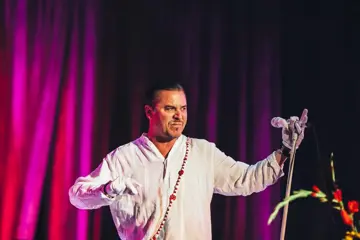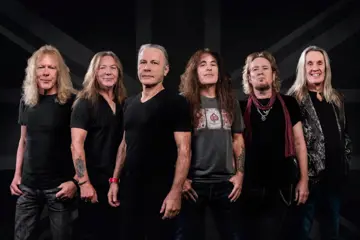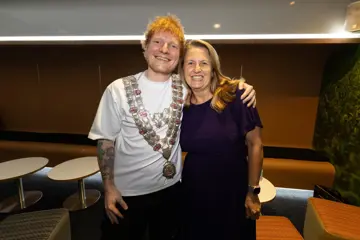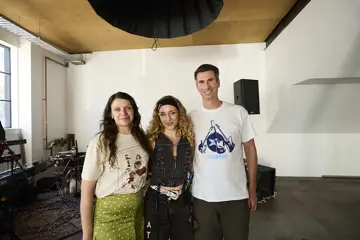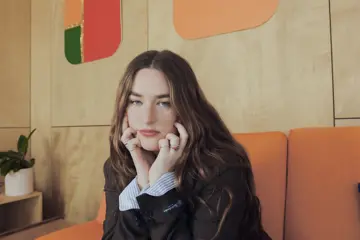 The Adults
The AdultsIconic NZ music Jon Toogood tells Brendan Crabb how The Adults' latest release mixes traditional Sudanese music with "contemporary western pop, dance and rock".
Casually quiz the always effervescent Jon Toogood about what he's been up to lately and the Melbourne-based, Kiwi-born musician will enthusiastically reel off a laundry list of recent activities; "I've been busy, but it's been very rewarding busy, so I've got nothing to complain about," he gushes.
Said endeavours include a newly announced 30th anniversary tour with hard rock mainstays Shihad, writing for Shihad's next record, becoming a father for the second time and completing a Master of Fine Arts at Massey University, Wellington (via long distance) based around the music on the new Adults record.
The last is the reason we're conversing. The Adults' second album Haja ("older, more experienced woman" in Arabic) was inspired by Toogood's wedding in Sudan, which featured traditional music, aghani al-banat, during the ceremony. He says the new LP mixes aghani al-banat with "contemporary western pop, dance and rock and shit". It's far removed from Toogood's first Adults record from 2011, which the producer/arranger/instrumentalist dubs "an indie-pop record with a bit of groove going on".
Don't miss a beat with our FREE daily newsletter
However, a collaborative manifesto binds the two releases together; only this time Toogood cast his proverbial net wider. "This Adults record was, I was making that music for myself after hearing these amazing female musicians at my wedding in Khartoum, Sudan, and going, 'Fuck, these guys sound like a new MIA record.' But they had no idea who that is, just because they speak Arabic and play this traditional, all-female form of music, which has its roots in the ghettos of Khartoum and the big cities in Sudan after the British colonised it around the 1900s and emancipated the slaves there.
"Now that's been co-opted by the upper class of Sudan as the soundtrack to every wedding you go to, which is completely weird but sort of cool at the same time. I was standing in the room with it going, 'Fuck, this is amazing. I wonder what that would sound like with a bass line?'" he laughs. "'Cause they're basically just playing drums and vocals, sort of in a hip hop way in a weird way. I just instantly fell in love with this catchy music."
This was in early 2014. He returned to Khartoum a year later and recorded with two aghani al-banat groups. "[Then] I went back to Melbourne, wrote all of this music over the top, played bass, bass, bass, 'cause it's all about bass," he explains. Toogood temporarily shelved the project after his son's birth. After re-listening to the material and opting to forge ahead, he enlisted producer Devin Abrams, as well as performers like rappers JessB and Raiza Biza, and singer/producer Estere Dalton; some of whom will comprise The Adults' live incarnation.
The Music suggests Haja refutes the notion there are no fresh ideas or avenues remaining for musicians to explore. "Absolutely. Making this record has been like a massive mind-opening and altering experience. Not only was I flying between Khartoum and Melbourne, then getting vocal tracks from people like Chelsea Jade sitting in Los Angeles, and Raiza Biza who's in Auckland after his parents escaped genocide in Rwanda. But I'm dealing with all these different ideas, experiences and cultures, and I'm like, 'That sounds like a record that I'd want to listen to,'" he laughs. "It's fresh, it's heavy, like if you turn it up loud it sounds fantastic. It's not heavy as in metal heavy, it's just powerful."
Haja's genesis stems from an "all-female day" at Toogood's wedding whereby he was the only man in a room of 300 women. Where does he feel this album fits within a world of various female empowerment movements? "Before I met my wife, I had quite generalised ideas of the role of Muslim females in Islamic societies, which I think were pretty misinformed. Which was the idea that females tended to play a background role, or a submissive role in an Islamic society. But not only was that challenged by meeting Dana, who's very in control of her own destiny, and very much a Muslim, but once I was in Sudan, meeting these musicians... They're very colourful, outspoken and strong. I just wanted people on this side of the planet to see that a little bit as well.
"I thought that if I paired their music up with female musicians that I knew from my side of the planet who were doing really interesting [music] and were totally in control of their own destinies, I could actually show, through the music, that there was a unifying thing between those two different sides of the planet. So that was definitely there in the background and part of the deal. But for me, ultimately I wanted a record I could dance to that sounded really good through a loud PA."





